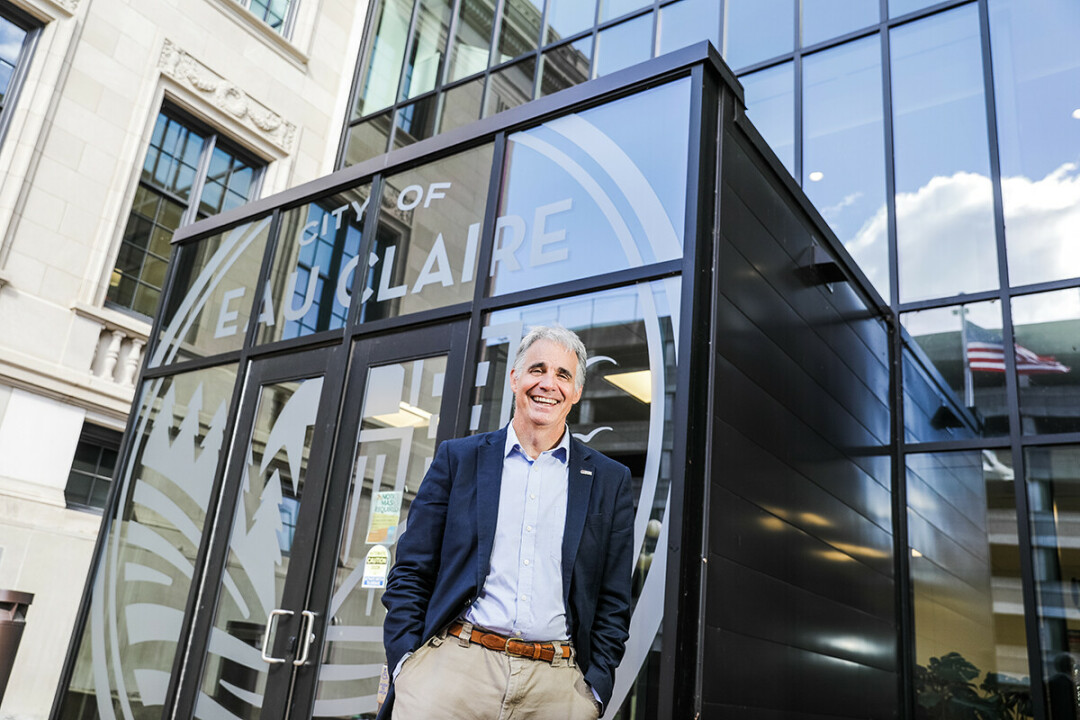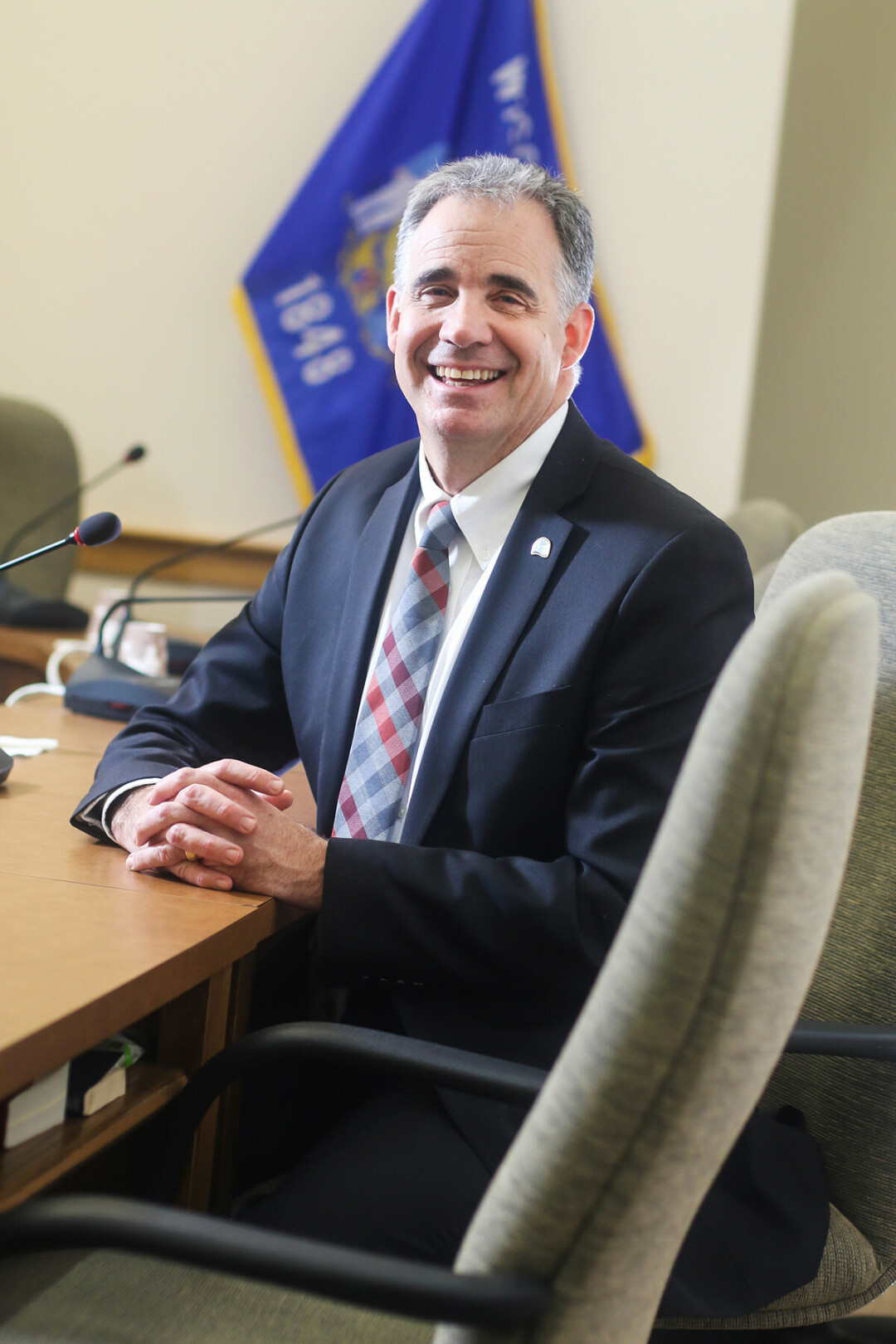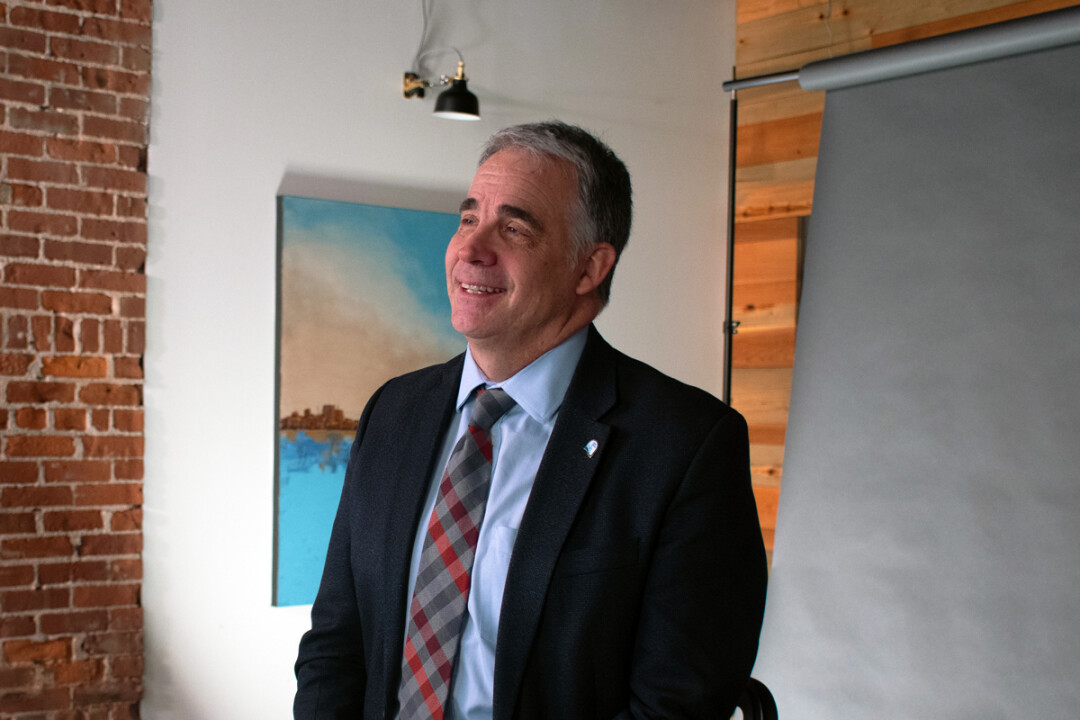Extended Goodbye: After COVID-Caused Delay, City Manager Retires
Dale Peters reflects on 31 years with the City of Eau Claire
Tom Giffey, photos by Andrea Paulseth |

Eau Claire City Manager Dale Peters was supposed to retire back in May. COVID-19 had other plans.
Of course, Peters could have continued with the timeline he announced in February, stepping down after 31 years with the city, the past five of them as city manager. Instead, he decided to stick it out for five additional months to help the city navigate the uncharted waters of the pandemic.
“It was a unique opportunity, and I certainly don’t regret staying,” Peters said. However, the delay in retirement was only temporary, and his last day with the city will be Oct. 21. (The City Council is expected to hire a replacement by the start of next year; until then, City Engineer Dave Solberg will serve as acting city manager.)
During an interview on a recent sunny autumn afternoon on a bench outside City Hall, Peters talked about his three decades with the city, what makes the community special, and the value of local government.
Volume One: You were originally supposed to retire in May. Then COVID-19 hit. How did you decide to stay on?
Dale Peters: It was a relatively easy and quick decision on. The community and the organization were about to face one of the biggest operational and community challenges that we’ve had in decades. If staying on for a few months could help smooth that transition, it was the least I could do.
How have the challenges you have faced in the past six months compared with other challenges you faced during your 31 years with the city?
We have a really strong team. My background in human resources and time with the organization helped me as we went into having to work remotely and respond remotely. I was fortunate to be able to rely on the relationships and knowledge of the organization that I developed over 31 years, which helped us be able to make the multitude of decisions that had to be made very quickly to maintain critical services like sewer and water and fire and police and street work in a way that was safe for the employees and safe for the community. We needed to settle into a different work schedule. We needed to divide our work into small groups. … Sending everybody home and stopping service was not an option. So it took everybody being nimble and flexible to figure out how to continue those core services.
Do you think that in future years this will help the organization because it had to develop that flexibility?
Like any crisis, personally or professionally, people grow and they learn and they become stronger. So yes, I think we were able to implement efficiencies and technology that had (previously) been slowly moving forward very quickly. And I think those efficiencies and service improvements and alternate ways of delivering services will be beneficial moving forward.

After getting your undergraduate degree at UW-Eau Claire, you got an MBA at UW-Madison and then worked in the corporate world. What brought you back to Eau Claire?
My wife and I wanted to move back to Wisconsin, and the city of Eau Claire had its first risk manager position available in 1989. And I applied and was granted the privilege of the job. At the time, I thought I would only be in the public service for three to five years and I would go back to the private sector. I found an organization that aligned with my heart for service. Now, it’s 31 years later.
What specifically was it about the city that kept you here?
It’s a high-quality organization with incredible individuals and a culture that allows for flexibility and learning. It’s an opportunity to do work that really impacts people’s everyday lives. The first thing you did in the morning was use a city service, and then when you flush the handle, it didn’t go into your basement. It went away to a place where it’s being cleaned in an environmentally responsible way. And then you drove on a city street and you walked down the city sidewalk. Local government provides the most tangible form of government in people’s lives every day.
”
For every public employee, every interaction we have provides an opportunity to either build trust or diminish trust.
DALE PETERS
RETIRING EAU CLAIRE CITY MANAGER
Is it ever frustrating as a city official to get complaints?
For every public employee, every interaction we have provides an opportunity to either build trust or diminish trust. When I’m presented with an opportunity for somebody that is critical, I look at it as an opportunity to help them understand the value that they receive for their property taxes. The average homeowner pays just over $100 a month for police, fire, parks, streets, snowplowing. It’s a good value when you compare it to the other services that people pay for.
When you look back at the past 31 years, what are the most positive changes within the city government or the community in general?
Certainly the biggest change is the transformation of downtown. One of the first projects I had in 1991 was the environmental cleanup of the land which now is Phoenix Park and RCU and Jamf. And so to have been part of the environmental cleanup of that land and to see what’s there now and the activity – it’s an amazing transformation. There’s no one individual that can be credited for that. It was a whole group of of people, from community leaders to regulatory agencies to elected officials to city managers that have kept tabs and constant focus on improving the quality of life.
We’ve had an intentional focus, rather than to be attracting specific businesses or industries, to just having an overall high quality of life that attracts people who want to live here and then employers who want to have access to those employees.
The thing that has been really unique and special about Eau Claire is our ability to collaborate and work together, even through challenging times. There’s a culture of finding solutions and even working through disagreements in a way that’s respectful to the relationship and focuses on long-term success rather than focusing on a short term disagreement or challenge. That’s not found in every community. The city and the county work as organizations, our nonprofit and our business community, they work very closely together to move the community forward, even though at times there can be differences of opinion.

What are the concerns you have for the community, the things that still need attention and need to be worked on?
The culture of collaboration and cooperation has to be intentional. And so it needs to be actively made a priority. It can be fragile. So with the stresses of COVID and racial injustice pulling at the fabric of civility, I think we have to be very intentional to maintain constructive, civil working relationships that are focused on long-term success. … More in the longer term is intentionally working to make Eau Claire a place that’s welcome for all people. There’s a lot of good energy right now around making constructive changes that can help Eau Claire be more welcoming. …
We’ve made some nice starts towards expanding our industrial land, and we need to continue the effort to make that industrial land available. We need to continue to create the culture of success for the downtown, for all businesses. … I think we’ll need some intentional focus on retail. We’ve been a bricks and mortar retail hub, and the online world of shopping – which accelerated with COVID – is also accelerating the challenges that our local retailers are having. …
The Gibson parking ramp is coming to the end of its useful life, and that’s going to be a significant change for downtown. How do we want to address parking, and what does parking look like for the next 40 years?
We’ve got a major expansion of the library and the new (bus) transfer center and the multiple floors of housing that will go on top of the transfer center with the federal TIGER grant.
What can the city do to foster affordable and safe housing?
You can work with developers to make sure that there are utilities available for development and there’s a regulatory environment that allows for high-quality, affordable housing. We can leverage state and federal programs that help with affordable housing at the low end of the income spectrum. We can encourage, through programs, homeownership. The rents in Eau Claire are average.
“Affordable” is a function of your salary to the cost of the rents. It’s our wages and salaries that are below average, which then create the affordable gap. So part of that formula of affordable housing is having quality jobs, so they can afford the housing that’s here, as well as being able to encourage more housing stock to be available.
What are you going to miss most about working for the city?
We’ve got some of the best employees doing really great work. Every day they go out of their way to make the world just a little better or brighter for their co-workers, neighbors, and the people in our community. It’s not everybody that gets the privilege of waking up each day and going to work in a place they really enjoy and with people they really enjoy working with, and I’ve had that privilege and honor for 31 years.
Your last day with the city is Oct. 21. What comes next?
My wife, Tally, and I are looking forward to traveling. I love sailing; sailing is my outdoor passion. So I look forward to sailing many more miles on the Great Lakes and in the oceans. There’ll be some canoeing in Canada. I like working in a wood shop.
Professionally, I’d really like to see Eau Claire have a hospice house … a facility for people at the end of life. A place where people on hospice can go where they and their families can be cared for with dignity and respect. Eau Claire doesn’t have a facility like that, and there’s no reason why Eau Claire shouldn’t have a facility like that.






















